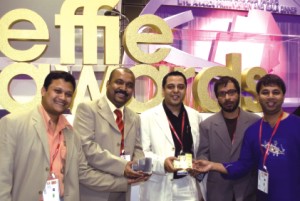|
Achievement
Effective Translation
Nader Rahman
 |
Gousul Alam Shaon |
It is often said that the worst thing about TV is the in your face non-stop advertising which ranges from the comical to quirky. Even after all our complaints there are a few ads which we are happy to see and unconsciously hum to ourselves long after they have left the screen. Those are the types of ads that captivate and impress while at the same time push a product, in the subtlest way possible. The ads we are talking about come from far away lands and are dreamt up in the minds of people far displaced from anything we know as Bangali. The fact that some of those ads are popular in Bangladesh is testament to their ingenuity and cross-cultural diversity that makes their appeal universal. While most ads are weeded out of our memory usually it is the flops and successes that stick in our minds, for wholly different reasons. Bangladesh is not known as the epicentre of creative and effective advertising, in fact one might argue the opposite, but by winning one award all that could change faster than we could have ever imagined.
On February 29 the first Asia Pacific Effie Awards were handed out with great pomp and pageantry at the Suntec Singapore International Convention and Exhibition Centre and by the end of the evening there was reason to celebrate for Bangladeshi advertising, Grey Advertising Bangladesh took home the second prize in the Consumer Durables section and thus became the first organisation to win such a prestigious international advertising award. For those who are wondering what they are, Effies celebrate effective creativity in advertising and marketing communications, in other words they are the Oscars of advertising.
Some might question the importance of an advertising award for a Bangladeshi team but those people must look at the award as more than just a medal, it is a sign of approval for 'effectiveness' as a new catch word in the business structure of a nation, a word which has long been absent. From our cricket team to our politicians millions of people have questioned the effectiveness of different groups of people and businesses within our own country. This award may be a drop in the ocean, but at least it's a start.
 |
Grey Team. |
The winning campaign from Grey Advertising Bangladesh was as revolutionary and insightful as it was entertaining and serves as a prime example of the type of work that can come out of our internationally undervalued nation. Gousul Alam Shaon, General Manager Strategy and Creative was the architect behind the plan. “Advertising must balance creativity with effectiveness if is to achieve its goals", he explains, "and that was where the idea for our campaign took off.” Grey was asked to prepare an ad campaign for Nokia which would relate the brand with the ethos of what it was to be Bangladeshi. With that in mind Nokia had already lined up what they wanted to market and that was a new line of cell phones with Bangla alphabets and interfaces. A link had to be created between the new phones and a campaign that would introduce those features as well as link them mentally to a home grown company, not one from a perceived outsider such as Nokia.
Over and above the obvious reasons of aligning Nokia with a local flavour there was another reason behind the campaign. As it so happens over 80% of the cell phones in Bangladesh are 'grey' phones - cell phones where the duty has not been paid and thus are slightly cheaper than the ones available from original dealerships where the duty has been paid. This 'grey market' is of great concern to all mobile manufacturers and Nokia was looking for a way to inform and persuade people to buy original sets from authorized dealers. With that in mind they came up with the idea of mobile phones with Bangla interfaces and those phones could only be bought from authorized dealers, thus putting the power back in their hands. The idea was simple but for it to be effective it needed a campaign that could merge the ethics of buying an original handset with the practicality and nationalism of buying a phone with a Bangla interface.
In a way Nokia wanted to reach closer to the hearts of Bangladeshis and their campaign for the new sets along with rooting out the illegal ones was how they were going to go about it. On this topic Shaon says, “what we wanted was something that would get people emotional about nationalism, but smartly, and that's where the idea spawned from.”
It was during the brainstorming process that the award winning idea came to Shaon: “I was thinking over some ideas trying to come up with a concept that would sum up everything that our client wanted. And then it came to me, that what they were pushing were mobile phones with Bangla interfaces and that would be very helpful to convey Bangali sayings, that would otherwise have been lost in translation.” The link was as clear as the client could have wanted, they would market the phones as a sort of Bangla accessory where through communication in one's own language everything could be conveyed. Not like text messaging in English when one is thinking in Bangla. Shaon's idea also came up with the campaign name “Lost in Translation”.
With their concept clear, Grey Advertising Bangladesh had to turn the concept into reality which was trickier than it seemed. Shaon says, “The project would not have worked if it was not for the tireless service given to us by Amitabh Reza. He made it with minimal cost and initially he did not even do it for the money.” Aside from Reza there were others who contributed to the success of the campaign, people such as Upol Chowdhury the creative director, Javed Akhter Shumon, Assistant creative director and Maruf from client servicing. Shaon adds, “over and above the local team this would not have taken off if it were not for Nirvik Singh, the CEO of Grey South Asia. He was extremely influential in the whole process and was one of the main inspirations.”
The ads still remain some of the best to come out of Bangladesh, it is easy to see why they won an international award. In one there is a Bangla saying "Khaile chatben, na khaile postaiben", written on a chatpoti van and it is easy to see that a saying like that just could not make sense in English, thus the tagline "Ai shudhu banglate shombhob" makes complete sense. Gone are the days of badly dubbed ads, fake acting and cheesy lines. There is a new level of ingenuity in Bangladeshi advertising which is epitomised by the Nokia campaign from Grey.
It takes a simple idea and humanises it, making it accessible enough for most people to understand and is done in such a way that it touches the heart of everyone who comes across it. Grey's creative team has accomplished this task and has managed to get international attention for it.
Copyright
(R) thedailystar.net 2008 |
